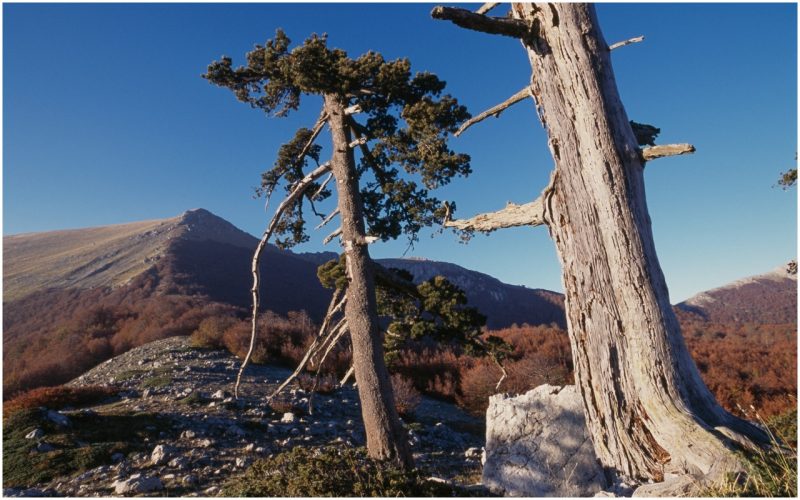
If you’re looking for the world’s record-breaker when it comes to the oldest tree on the planet, experts say head to the Great Basin National Park in the United States and search for a bristlecone pine with an age determined to be a flabbergasting 5,065 years.
As for the oldest tree in Europe, travel to the south of Italy, in the Pollino National Park.
There a Heldreich’s pine or Pinus heldreichii, nicknamed Italus, has been rising on a mountainous ridge, some two hours’ drive from the city of Naples, for about 1,230 years.
The chances are that there could be older trees in Europe, but as of now, the spotlight is on Italus, which, after an in-depth scientific dating, has been recognized as the oldest tree on the Old Continent.
The news was revealed by scientists in a paper published in the journal Ecology on May 16, 2018.
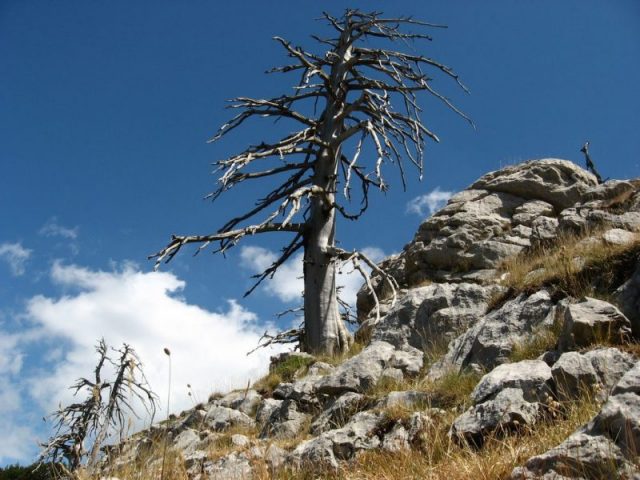
Pinus heldreichii (Serra delle Ciavole). Photo: Potito m. petrone – CC BY-SA 3.0
Rooted in an age-old forest, and still standing with its now whitened trunk, Italus seems to have far surpassed the expectations for its age.
The analysis, which was meticulously carried by experts, combining several different methods, proved not only the extreme age of the pine but also that the tree has recently added new rings to its trunk.
To pin down the age of Italus, experts have faced a few challenges, however.
As a co-author of the study, Alfredo Di Filippo, told the National Geographic, “The inner part of the wood was like dust—we never saw anything like it.”
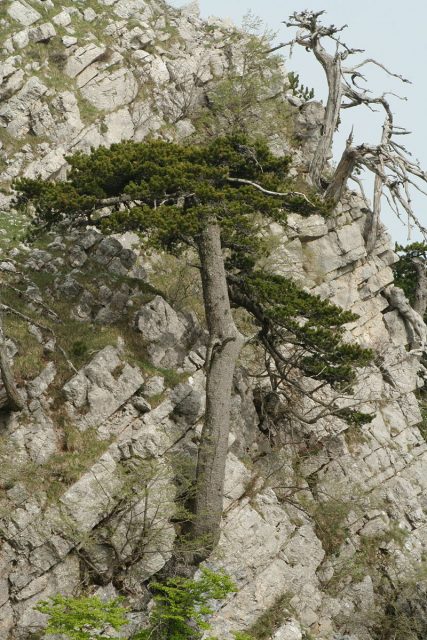
Monte Pollino, southern Italy Photo: patrina_io –
CC BY 2.0
Di Filippo, who is a professor at the Italian Tuscia University, said there were at least 7.9 inches of wood missing, which equates to a substantial number of years. In fact, it was the part of the tree that contained the oldest of all rings that were gone.
Which is why the research team, led by Gianluca Piovesan, needed to consider several methods to work out the pine’s age.
To see when the tree first started to sprout, the team used radiocarbon-dating on the roots that were exposed, then compared the tree-rings in its roots with those that were sampled from the trunk.
“By joining these two methods, we were able to establish the time frame much more precisely,” says Piovesan
Eventually, an accurate calculation was made that Italus has been in its place since around the year 789. The Pollino National Park was established quite recently in the tree’s long lifetime, in 1993.
The year in which scientists suggest the tree was born was an interesting one.
It was the time when King Pepin of Italy captured Istria, when King Charlemagne came to the Baltic, and also just about the time when the first Vikings appeared in England, according to the Anglo-Saxon Chronicle.
This happened only two years after the first Viking raid in Dorset, the first event of its kind on the British Isles.
These are now distant events in history, and Italus, which researchers are confident is healthy enough to enter the 14th century of its life some 70 years from now, has been a silent observer of history ever since.
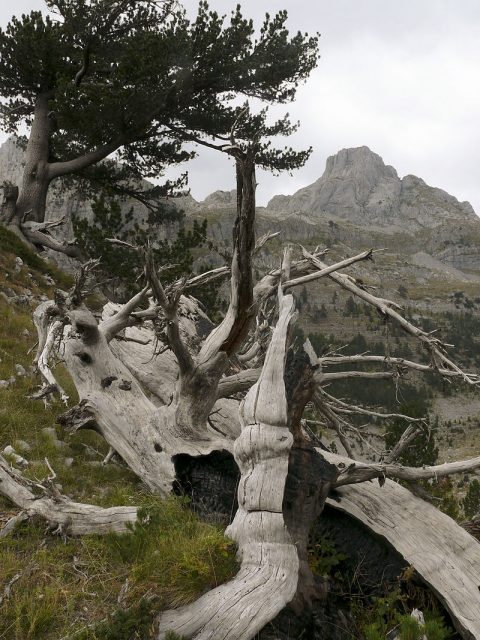
Heldreich’s pine Photo by Jirka Dl – Own work
CC BY-SA 3.0
And not only history. According to the National Geographic, the ancient arbor is also a silent observer and survivor of climate change.
Italus would have endured the harsh winters, colder than now, that marked a significant portion of the medieval era, after which it continued its life through times of much warmer temperatures but also severe drought seasons.
An analysis of the tree rings from different periods indicate the tree formed very narrow rings for a couple of centuries, while wider rings are the product of the more recent decades, a signal that it is currently living in a more favorable environment, according to National Geographic.
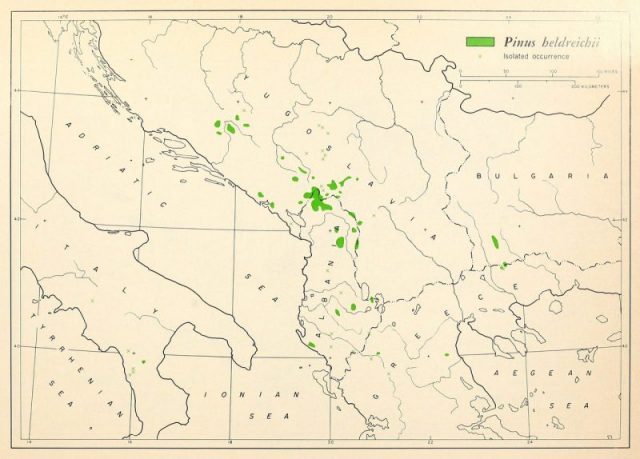
Map 28. Pinus heldreichii distribution
As the team that worked on the case point out, undertaking research on ancient trees is important for providing scientific knowledge of how trees and forests as a whole may react to climate change in the present.
On being pronounced the oldest scientifically dated tree in Europe, Italus stole the title from another Heldreich’s pine; the previous record holder, named Adonis after the ancient Greek deity of beauty and desire, is rooted in Greece and 1,077 years old.
Its age was determined by scientists in 2016, a process that reportedly progressed much more easily than the latest effort for Italus.
Northern Europe can take further pride in being the home of Old Tjikko, a Norway spruce aged some 9,560 years and counted as the oldest individual tree in the world.
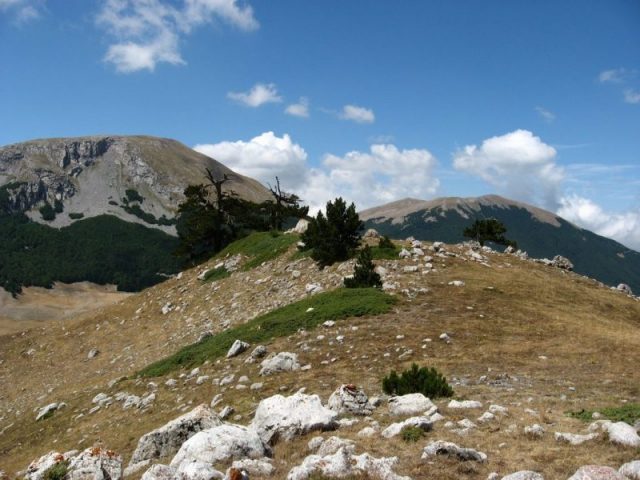
Monte Pollino Photo by:Potito m. petrone – CC BY-SA 3.0
The principal reason why this tree has such an unbelievable age is vegetative cloning; the same roots of Old Tjikko have produced new trunks for over nine millennia now.
Scientists identified its age after carbon dating only its roots, as the most recently formed trunk is much younger.
